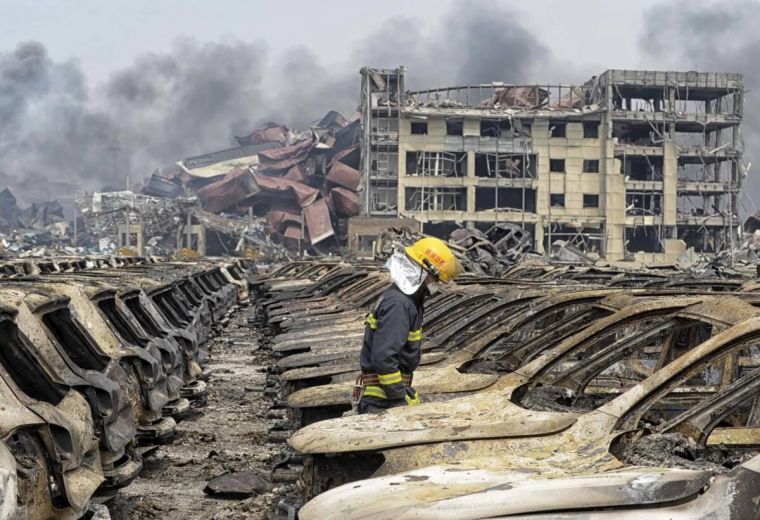China blasts death toll is now 112 and likely to rise as scores of firefighters missing

The death toll from massive explosions in China's port of Tianjin has risen to 112 and 95 people, most of them fire fighters, are missing, state media said on Sunday, suggesting the toll will rise significantly.
More than 720 people remained in hospital four days after Wednesday's disaster, which sent massive yellow and orange fireballs into the sky, rained burning debris on to a vast industrial zone, crumpled cars and shipping containers, burnt out buildings and shattered windows of nearby apartments.
President Xi Jinping on Saturday urged authorities to improve safety and learn lessons paid for with blood.
China evacuated residents who had taken refuge in a school near the site of the blasts on Saturday after a change in wind direction prompted fears that toxic chemical particles could be blown inland.
It was not clear from media reports how many people were evacuated, but the order came as a fire broke out again at the blast site, a warehouse specially designed to store dangerous chemicals, according to Xinhua.
Officials acknowledged the presence of toxins but said they posed no risk to people outside the evacuation zone.
"I can responsibly say that there will be no secondary damage to the people," Shi Luze, the chief of staff of the People's Liberation Army's Beijing Military Region, told reporters, referring to people outside the zone.
Shi confirmed the presence of more than 100 tons of deadly sodium cyanide, stored at two separate sites. He said workers were trying to clear the area of chemicals before possible rain showers, which could create toxic gas.
Greenpeace in an emailed said its tests around the blast site showed that local water supplies were not severely contaminated with cyanide, but that they did not "disprove the presence of other hazardous chemicals in the water".
"Greenpeace reiterates its call for authorities to implement a comprehensive survey of hazardous chemicals currently present in air and water supplies and make public all information," it said.
In an earlier statement, Greenpeace urged the government to establish a three-mile evacuation zone.
Some 6,300 people have been displaced by the blasts. Shockwaves were felt by residents in apartment blocks kilometres away in the city of 15 million people.
About 100 people from a residential area near the blast site protested outside a hotel where a government press briefing was held, angry that dangerous chemicals had been stored near their homes.
"I'm very worried that these dangerous chemicals will harm my health," said Zhang Yinbao, who works in the chemical industry and whose apartment building is only 800 metres from the blast site.
"The government has said they won't have a big impact, but we have no way to know for sure," Zhang said, calling for a thorough investigation and compensation.
About three dozen family members of missing fire fighters marched to district government offices where they were dispersed by police after scuffles.
Eighty-five of the 95 missing are fire fighters.
After Wednesday's blasts, fire crews were criticised for using water to douse flames which may have contributed to the blasts given the volatile nature of the chemicals involved.
Industrial accidents are not uncommon in China following three decades of fast growth. A blast at an auto parts factory killed 75 people a year ago.











